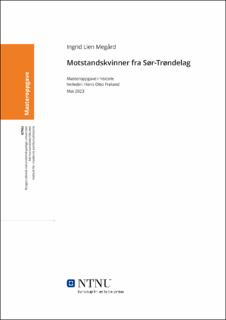| dc.description.abstract | I denne masteroppgaven undersøker jeg hva som har blitt skrevet om motstandskvinner i krigslitteraturen fra 1945 frem til i dag. Det kommer tydelig frem at motstandskvinner i lang tid har blitt neglisjert i litteraturen. Det som først ble skrevet om kvinner under andre verdenskrig tegnet et bilde på kvinner som hverdagshelter som sørget for mat på bordene, og som nærmest tryllet frem klær av stoffer som ikke fantes. I forskningsprosessen undersøker jeg et utvalg motstandskvinner fra Sør-Trøndelag ved å ta utgangspunkt i kvinnelige fanger under krigen. Ved å undersøke fangekort, fangeprotokoller, intervjuer og andre egodokumenter har jeg analysert 209 motstandskvinner og gitt innsikt i deres kollektive motstandshistorie. Etter å ha studert disse kvinnene har jeg kommet frem til at tidligere litteraturs fremstilling av motstandskvinnene under krigen er ufullstendig. Kvinner deltok i aller høyeste grad i motstandsbevegelsen, og gjerne på samme måte og med samme type oppgaver som motstandsmenn. Jeg har i analysen av motstandskvinnene undersøkt hvordan og hvorfor de bidro i motstandskampen. I hovedsak viser analysen at variasjonen innenfor type motstand var stor. Kvinnene levde ulike liv og hadde ulike forutsetninger for å delta i motstandskampen. Derfor var det også stor variasjon i hvordan de bidro i kampen om ett fritt Norge. Når det gjelder kvinnenes motivasjon for å bidra i motstandskampen var alle kvinnene helt fra starten av krigen klare på at nazistene og deres politikk var noe de ønsket å ta avstand fra. Det er denne holdningen og kvinnenes egne politiske meninger jeg anser som kvinnenes motivasjon til å bidra. Videre har jeg også diskutert hvorfor kvinnene så lenge ble neglisjert fra krigslitteraturen, og presenterer flere mulige årsaker som kan ha bidratt til dette. Blant disse kan både kvinnenes egen taushet, endring i kjønnsrollemønsteret og samfunnets manglende interesse for forskning på kvinnehistorie nevnes. | |
| dc.description.abstract | In this master´s thesis, I have analysed the literature written about Norwegian women in the resistance in the Second World War from 1945 to the present. The women have been omitted from literature for a long time. What was first written about women during the Second World War pictured women as everyday heroes who made sure there was food on the tables, and ensured clothes were made from materials that were near to nothing. In the research process, I analyse a selection of the women from the Norwegian resistance from Sør-Trøndelag based on female prisoners during the war. By investigating prison cards, prison protocols, interviews, and other ego documents, I have analysed 209 women of the Norwegian resistance and given an insight to their collective history. After examining these women, I have concluded that the image given by previous literature about the Norwegian women of the resistance during the war is incomplete. Women participated largely in the movement of the resistance, and often in the same way and with the same tasks as the men. In the analysis of the women of the Norwegian resistance, I have investigated how and why they contributed to the resistance within Norway. In essence, the analysis shows that the variation within the type of resistance was large. The women lived different lives and had different prerequisites for participating in the resistance struggle. Therefore, there was also great variation in how they contributed to fight for Norway to be a free country. Regarding women´s motivation to contribute to the resistance, all of the women I have analysed were determined from the start of the war that they wanted to distance themselves from the Nazis and their politics. Their opinions and the women´s own political point of view is what I consider to be their motivation to stand against the Nazis. Furthermore, I have also discussed why the women of the Norwegian resistance were neglected from the war literature for so long. I present several possible reasons to what may have led to this. Among these causes can both the women´s reluctance to tell their story, changes in the gender role pattern and the society´s lack of interest in research on women´s history be mentioned. | |
